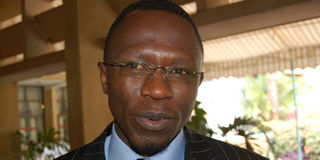House team demands JSC minutes

Justice and Legal Affairs Committee led by Ababu Namwamba insisted on being given minutes of the Judicial Service Commission's first meeting February 10, 2011. FILE
A meeting between Parliament’s Justice and Legal Affairs committee and representatives of the Judicial Service Commission began on a stormy note after some MPs insisted on being given minutes of the JSC's first meeting.
At the committee hearing held Thursday afternoon at Nairobi’s County Hall, MPs George Nyamweya (nominated, PNU) and Amina Abdallah (nominated, Kanu) vehemently sought the minutes of the meeting that led to the JSC’s declaration that President Kibaki’s nominees to sit in four constitutional offices were illegal.
The two lawmakers, buoyed by the support of their two colleagues Njoroge Baiya (Githunguri, PNU) and Millie Odhiambo (nominated, ODM) managed to convince their reluctant chair, Mr Ababu Namwamba, that it was crucial for the committee to be told if the current Chief Justice, Mr Justice Evan Gicheru, chaired the meeting.
The lawmakers’ argument was hinged on the perception that Mr Gicheru’s presence in the meeting amounted to conflict of interest.
“If I was in that meeting and my position was the subject of discussion, I would excuse myself from that meeting…We need to know who chaired the meeting. That’s just basic information, I don’t understand there’s difficulty in giving it,” said Ms Abdallah as she tried to convince Mr Namwamba to allow JSC commissioners Florence Mwangangi and Emily Ominde to respond to her question.
Ms Ominde replied that the Chief Justice chaired the meeting as “constitutionally mandated” under section 172(2)(a). She added that the Registrar of the High Court, Ms Lydia Achode, was the secretary, also, according to the Constitution.
Ms Mwangangi said that looking at the Constitution, the Chief Justice was not an interested party, because, in any case, he didn’t qualify for the position.
The new law directs that the current Chief Justice, if vetted and approved by the House, will continue serving in the Judiciary as a judge of the Court of Appeal.
The JSC duo maintained that the nominations were illegal and said that even if the President and the Prime Minister had agreed on the nominees –something that might have avoided the current uproar—the JSC would still have objected.
They said the Sixth Schedule ought to be read together with the articles in the Constitution in order to uphold the spirit of the Constitution.
“Section 24 (of the Sixth Schedule) cannot be read in isolation with all other articles in the Constitution, especially article 166,” said Ms Mwangangi.
Ms Ominde told the House Committee that the way forward will be a fresh start characterized by competitive recruitment.
“Our desire would be that the process be competitive and transparent, so that the holders of these offices are persons who are accountable to the institution as well as the Republic,” said Ms Ominde.
“The principals can say, give us ten or so names. We’ll advertise, then we call them and present them to the principals. From the list, they can pick a name and present to Parliament. If Parliament doesn’t approve, the principals will have a pool to pick from.”
Ms Mwangangi noted that the JSC was the acme of public participation in the nomination process because through advertisement of the positions, it’d have achieved “competitive sourcing”.
"After a proper reading of this particular section (24 of the Sixth Schedule), it was felt that maybe by the time the Constitution was enacted, the JSC may not have been in place (and a vacancy would have occurred in the Chief Justice’s Office). In that case that section would come in handy,” Ms Ominde added.
“But now the JSC is in place and there’d be no harm of it being given a chance to sort out this important function…`Upon promulgation, the Constitution says the JSC should be in place within sixty days. The presumption is that the JSC was supposed in place so that it participates in the recruitment of the next Chief Justice.”
They said that inasmuch as the Constitution was clear as to when the current Chief Justice should leave office, it was silent as to when a new one should be appointed.
Ms Ominde said, in her personal capacity, that should a vacancy occur, then the Presiding Judge of the Court of Appeal, Mr Justice Riaga Omollo, could be appointed to act while the recruitment for Mr Gicheru’s successor went on through the constitutional process mapped out by the JSC.
Mr Justice Omollo sits on the JSC and was among whose names were considered before the President made the disputed nominations.
She said the Sixth Schedule exploited by the Executive in the disputed nominations was intended to recognize the unique power-sharing agreement before the next elections.
“Let’s not forget what happened in 2007 elections… Confidence on whether the Judiciary is delivering is a matter of perception. It’s the public to gauge that confidence,” Ms Ominde said.
Mr Isaac Ruto (Chepalungu, ODM) urged the committee to “never” sit while Parliament’s session was on-going to avert future betrayal by some MPs, who whenever they fail to convince the House, they rush to Parliament and seek support on other MPs.
The House committee was scheduled to meet Mr Mohammed Isahakia, the permanent secretary in the office of the Prime Minister.
Thursday’s afternoon meeting came as the committee rushed to beat the 2.30pm deadline, by which it is supposed to present the report to Parliament giving its views about whether the nominations of Mr Justice Alnashir Visram as Chief Justice, Prof Githu Muigai as Attorney General and Mr Kioko Kilukumi as Director of Public Prosecutions.




